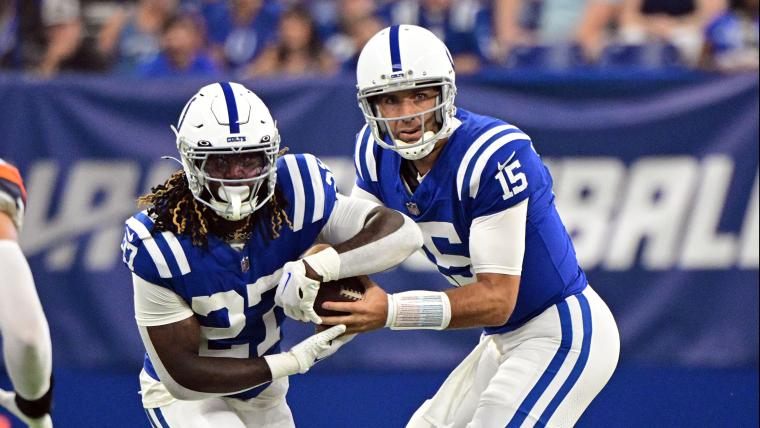The Indianapolis Colts have laid the groundwork for their roster heading into the upcoming NFL season, but there are still numerous adjustments that need to be made. General Manager Chris Ballard has consistently emphasized the importance of staying vigilant and ready to capitalize on opportunities that could enhance the team’s roster or future draft assets.
As Anthony Richardson embarks on his second NFL season after a rookie year marked by four starts, the Colts have added veteran quarterback Joe Flacco to support him. This combination is expected to be beneficial for the team’s offense under the guidance of head coach Shane Steichen.
In a recent piece by Alex Kay of Bleacher Report, potential pre-Week 1 trades for various teams were explored, and Kay proposed that the Colts might consider trading Flacco to the Chicago Bears in exchange for a 2025 sixth-round pick. According to Kay, the Colts would send Flacco and a 2026 seventh-round pick to the Bears for the aforementioned pick.

Kay noted that Flacco, who joined the Colts this offseason as a backup for Richardson, might be expendable given the presence of Sam Ehlinger, a fourth-year quarterback, and the impressive performance of undrafted rookie Jason Bean during the preseason. With Bean emerging as a notable performer, Kay suggested that the Colts might be inclined to clear their quarterback roster by trading Flacco to Chicago.
However, this proposed trade might not be the most prudent move for the Colts. While Bean’s preseason success is encouraging, he is still relatively inexperienced and may not be prepared to handle backup responsibilities in a real NFL game. Additionally, Ehlinger has shown that he is better suited as a third-string quarterback rather than a reliable spot starter. Retaining Flacco provides the Colts with a more dependable option in case of an emergency, given his experience and ability to make downfield throws.
Last season, the Colts saw some positive contributions from Gardner Minshew, but the offense’s potential was somewhat constrained by his more cautious playing style. Flacco, on the other hand, offers a higher upside as a backup quarterback. His presence not only supports Richardson’s development but also ensures that the Colts have a viable starting option if needed.
Overall, while the idea of trading Flacco for a draft pick may seem appealing from a future asset perspective, the immediate benefits of keeping him as a backup quarterback might outweigh the potential gains. The Colts could find greater value in having Flacco’s experience and capability available to support Richardson and manage any unforeseen circumstances that may arise during the season.

